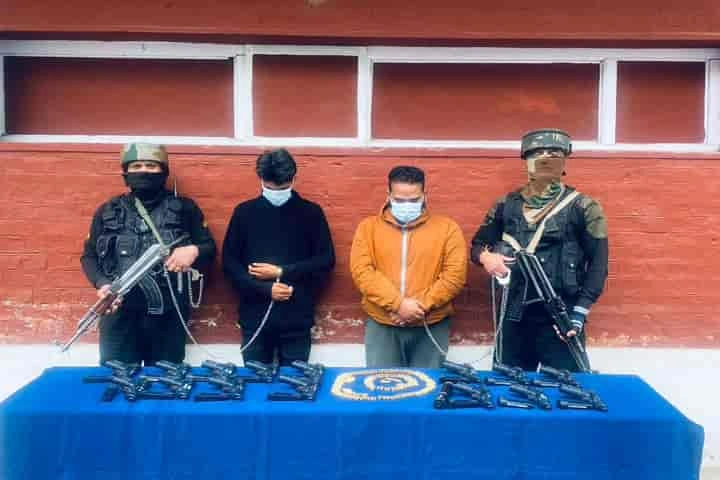The United States State Department has told the US Congress that that the global terrorist groups, including Lashkar-e-Tayyiba (LeT), Jaish-e-Mohammad (JeM), Hizbul Mujahideen (HM), ISIS and al-Qaeda, engaged in terrorist activities in Jammu and Kashmir, have a prominent presence in Pakistan and operate from there. The US state departments “Country report of terrorism-2020” confirms that the LeT, JeM, HM, ISIS and Al-Qaeda continue to be active in the Indian Union Territory of Jammu and Kashmir.
"In 2020, terrorism affected the Indian Union Territory of Jammu and Kashmir (J&K), Northeast India and regions in central India. Major terrorist groups have been active in India, including the Lashkar-e-Toiba, Jaish-e-Mohammed, Hizbul Mujahideen, ISIS and Al-Qaeda in the Indian subcontinent,” the report said.
“South Asia in 2020 saw, in addition to continued terrorist activity in Afghanistan and Pakistan, a volatile mix of insurgent attacks punctuated by incidents of terrorism in the Indian Union Territory of Jammu and Kashmir as well as in Maldives and Bangladesh.”
Specifically focusing on the Islamic State in Iraq and Syria (ISIS), the report says though ISIS lost its territory in Syria, new branches of the outfit in 2019 in Pakistan and India, where they continue to operate. Other ISIS-affiliated groups claimed responsibility for attacks in the Maldives and Bangladesh in 2020. Though al-Qa’ida has weakened, its regional affiliate in the Indian subcontinent (AQIS) continued to operate from remote locations that have served as safe havens, says the report.
“Regionally, however, terrorist groups continued to operate from Pakistan. Groups targeting Afghanistan — including the Afghan Taliban and affiliated HQN, as well as groups targeting India, including LeT and its affiliated front organizations, and Jaish-e-Mohammed (JeM) — continued to operate from Pakistani territory. Pakistan did not take action against other known terrorists such as JeM founder and UN-designated terrorist Masood Azhar and 2008 Mumbai attack ‘project manager’ Sajid Mir, both of whom are believed to remain free in Pakistan”, it added.
“Pakistan convicted Lashkar-e-Tayyiba (LeT) founder Hafiz Saeed and four other senior LeT leaders in multiple terrorism financing cases. The Sindh High Court overturned the 2002 convictions of Omar Sheikh and three co-conspirators for the 2002 kidnapping and murder of U.S. journalist Daniel Pearl on April 2 and ordered their release on December 24 (2020)”, the report said about the killers of the famous American journalist.
"Pakistan did not take action against other known terrorists such as JeM founder and UN-designated terrorist Masood Azhar and 2008 Mumbai attack 'project manager' Sajid Mir, both of whom are believed to remain free in Pakistan," the report states.
But in its finding, the report however praised India’s National Investigation Agency (NIA) to combat terrorism in Jammu and Kashmir and other parts of the country. “ Indian counterterrorism forces, at the federal and state levels, actively detected and disrupted transnational and regional terror forces. The National Investigation Agency examined 34 terrorism-related cases related to ISIS and arrested 160 persons, including 10 alleged Al Qaeda operatives from Kerala and West Bengal, in September (2020)”, said the report.
The report cites the example of a crackdown by the Indian security agencies on several key members of Al-Qaeda-affiliated Ansar Ghazwat-ul-Hind in Jammu & Kashmir.
While recording that the Indian security agencies were effective in disrupting terror threats, the US report noted there were still gaps in inter-agency intelligence and information sharing at the national and State levels.
In the absence of a National Counter Terrorism Centre, the Indian Multi-Agency Centre (MAC) collaborates with the United States on exchanging terrorist screening information and conducting real-time collation and sharing of intelligence among federal and state security agencies. Several Indian States have established State-level MACs to disseminate terrorism information to law enforcement, it said.
“India is implementing UNSCR 2396 to improve detection and deterrence of terrorist travel by using watchlists, implementing biographic and biometric screening at ports of entry, and expanding information sharing,” the report added. Contrarily in Pakistan, the US report noted that some madrassas continued to teach extremism and violence.
“While the Government (of Pakistan) continued efforts to increase madrassa regulation, some analysts and madrassa reform proponents observed that many madrassas failed to register with the Government, provide documentation of their sources of funding, or comply with laws governing acceptance of foreign students,” it said.
It added that the United States “continues to build its strategic partnership with the Government of India, including through bilateral engagements such as the 17th Counterterrorism Joint Working Group and Third Designations Dialogue in September (2020), as well as the third 2+2 Ministerial Dialogue in October (2020)”.
In September 2020, the US and India held the 17th meeting of the Counterterrorism Joint Working Group and Third US-India Designations Dialogue. In December, India proposed to hold another Quad counterterrorism tabletop exercise along with the US, Australia, and Japan.
Also Read: Pakistan remains a safe haven for terrorists, including 2008 Mumbai attack masterminds: US report




















